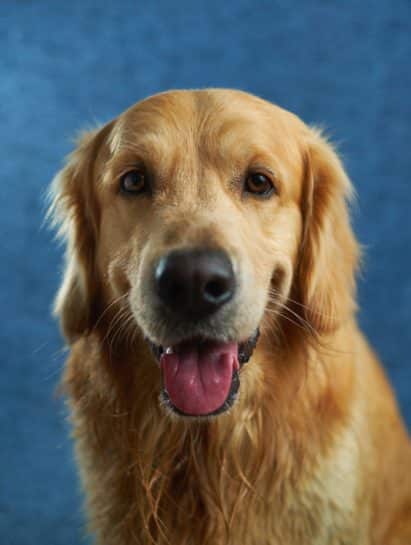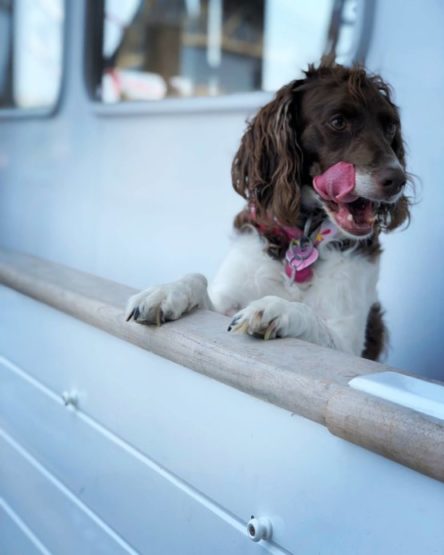Can dogs eat coleslaw? Many dogs really have a diet by the book. If you have a furry friend, you too have probably fed it with something more or less inappropriate.
Dogs should ideally eat lots of proteins and fats with a small number of vegetables and grains.
However, this rarely happens in reality as those little beggars often persuade humans to give them all kinds of treats.
Other dogs are fed with leftovers so offering them foods such as coleslaw doesn’t seem like a bad idea. But is it actually safe?
Can Dogs Eat Coleslaw?

‘Can dogs eat coleslaw?’ may sound like a silly question. However, this can happen even if you are very careful about your dog’s diet.
If you are giving your dog table scraps, a certain quantity of coleslaw can reach the dog’s food bowl. A family member who is not aware can give the dog human food without you even knowing.
There is also the fact that dogs often beg for human treats. We all know the look that dogs give when you are preparing food.
If you fall prey to their insistences, dogs can be fed with pretty much anything. You may end up giving them even chocolate, which is notoriously harmful to canines.
And last, the dog can have some coleslaw or another unsuitable human food by accident. You leave some leftovers on the kitchen table and the dog comes and enjoys a little feast.
Either way, ingestion of harmful foods can happen to any dog. The result can be a stomach upset followed by a costly visit to the vet.
The best thing to do is to be cautious about dogs eating leftovers. Also, never listen to them when they beg for food that can harm them!
What is Coleslaw and What Does it Contain?

Coleslaw is a side dish made from shredded raw cabbage with a salad dressing.
If you make your coleslaw at home, the list of ingredients can be very short. But if you buy it from the supermarket, it may contain many other ingredients besides cabbage.
A commercially-available coleslaw salad may include the following ingredients: mayonnaise, carrots, cream, onions, vinegar, sugar, salt, preservatives, coloring, and flavors.
Mayonnaise in its turn will contain oil, whole eggs, vinegar, and stabilizers.
In other words, it is a food consisting of raw cabbage and lots of oils, sugar, and preservatives.
None of these are good for a dog’s digestive system. The main ingredients are bad for dogs and there are also preservatives and other food additives. These are not good either for dogs or for humans.
Which Coleslaw Ingredient is Bad for Dogs and Why?
Most of the ingredients of coleslaw except for cabbage are bad for dogs. The most offensive are cream, mayonnaise, onions, sugar, and preservatives.
Let’s see why each of these ingredients are not suitable for dogs:
- Mayonnaise
Mayonnaise is not necessarily toxic to dogs. It consists of an emulsion of oil and egg yolks with vinegar, mustard, or lemon juice.
Its ingredients are not harmful, but the issue is a large amount of fat.
A diet rich in fats can cause problems such as digestive upset or pancreatitis. [1]
Avoid mayonnaise if your dog has a predisposition towards pancreas problems. These dogs can get sick even after ingesting a few tablespoons of mayonnaise.
If your dog has eaten mayonnaise and has diarrhea, vomiting, and other digestive symptoms, contact the vet immediately.
- Onions
Onions are a major no-no for canines. They contain a substance that is toxic to dogs and can cause serious problems. [2]
The culprit is called N-propyl disulfide, a compound affecting red blood cells and eventually causing anemia.
It attacks oxygen molecules in red blood cells, thus reducing their ability to carry oxygen to tissues.
The compound is found in all parts of the onion plant. A dog weighing 45 pounds will experience dangerous toxicity levels by eating as little as a medium onion.
Symptoms of anemia caused by the ingestion of onions include lethargy, lack of appetite, weakness, pale gums, fainting, and red urine.
The treatment consists of inducing vomiting and supportive care until the damaged red blood cells are replaced.
- Cream
The cream can be tolerated or not by dogs and other species, including humans. Some dogs digest dairy products without any issues, while others are lactose intolerant. [3]
Pets and humans who are lactose intolerant lack an enzyme called lactase. The role of this enzyme is to break down the two sugars in lactose so they can be properly digested.
Lack of this enzyme can lead to negative reactions to milk and dairy products.
Signs of lactose intolerance are diarrhea, vomiting, and gas. Offering dairy products in gradually larger quantities is the way to find out whether your dog tolerates them or not.
- Sugar
Although dogs need a small percentage of carbohydrates in their diets, sugars like the ones found in sweets are harmful.
Sugary treats can cause an upset stomach, dental caries, weight gain, metabolic changes, and even type II diabetes. [4]
If you want to give your dog something sweet, opt for fresh fruit that are not toxic to them. Make sweet fruit just an occasional treat and not a habit.
- Preservatives and flavors
These ingredients can be harmful to dogs or downright toxic. Preservatives like BHA, BHT, and ethoxyquin are the most dangerous.
They are known to cause allergies and even cancer. Artificial colors and flavors can make dog food look and taste better, but their negative effects outweigh the advantages.
Opt for natural foods both for you and your dog! Good quality food is naturally palatable and does not require these additives.
Why Your Dog Should Not Eat Coleslaw?

To put it bluntly, coleslaw has zero nutritional value for dogs. Plus, it may contain a series of ingredients that are harmful to dogs.
Negative effects can be visible immediately or in the long term.
Coleslaw is a food rich in fat and sugar and low in protein and fiber. Even for humans, it should be a side dish and not the main source of nutrition.
It also has lots of calories, which can be a problem for small breeds. 100 g of coleslaw makes up for about 25% of the necessary daily calorie intake for a small dog.
For a medium-sized dog, the same amount of coleslaw represents around 10% of their daily recommended calorie intake.
So why load the dog with empty calories while also risking health problems? There are many other healthy options to choose from.
Healthy Alternatives to Coleslaw
There are dogs who like veggies and salads and will gladly include them in their diet.
Vegetables have benefits such as delivering to your dog vitamins, minerals, and fiber.
There are vegetables that are safe for dogs, vegetables to be consumed in limited quantities, and vegetables to avoid entirely.
Green light for the following vegetables: cabbage, cauliflower, broccoli, lettuce, spinach, kale, bell pepper, carrots, beets, and turnips.
Yucca is particularly suitable because it can provide relief from digestive problems in dogs.
Serve with caution the following vegetables: yams, potatoes, and sweet potatoes because they are high in starch.
Avoid entirely vegetables such as onions, garlic, shallots, scallions, rhubarb, and most mushrooms. Many of these are toxic to dogs, even if they are safe for human consumption.
What Can Happen if Your Dog Eats Coleslaw?
Can dogs eat coleslaw and what can happen? A very small amount of coleslaw may cause zero to little problems for your dog. A larger amount of this dish and/or regular consumption can cause an array of unpleasant symptoms and issues such as:
- Diarrhea or loose stool;
- Vomiting;
- Anemia symptoms (if the salad contains onions)
- Obesity
- Metabolic changes
- Diabetes
While some of these problems are reversible, others are impossible to eliminate once they set in. Certain health issues caused by a poor diet can require lifelong treatment and medical supervision.
What is a Healthy Dog Diet?

Dogs are carnivores but can do well on an omnivorous diet as well.
Whenever you are in doubt regarding what you should feed your dog, recap the ideal dog diet. The following tips should help you ensure healthy nutrition for your pooch:
- Dog diets should be individualized; you have to observe how your dog is tolerating various foods;
- Exclusively raw diets can cause nutritional deficiencies in dogs; [5]
- Avoid highly-processed foods, especially for puppies;
- Canned wet food is the most appropriate, but kibbles can also represent a part of the dog’s diet;
- A small amount of carbohydrates from healthy sources provides dietary fiber to your dog;
- Add in fresh vegetables and fruit, taking care to avoid onions, citrus, grapes, and avocado;
- Buy food that is appropriate for your dog’s age and nutritional needs;
- Home-cooked meals can be tricky to prepare because most recipes lack the necessary levels of at least one nutrient;
- Feed your dog one or two times a day;
- Offer treats in limited amounts as excess food can cause your dog to gain too much weight.
Read Also: Can Dogs Eat Tapioca Often
Conclusion
Your dog can eat coleslaw in small amounts and possibly be OK. However, coleslaw is not suitable for dogs and most times it will make them ill.
Our advice is to never feed dogs with coleslaw. The consequences will be unpleasant both for the dog and you.
The dog will feel very uncomfortable and you as its owner may have to take him to the vet. Next, you will need to care for and manage his digestive upset until recovery. It is simply not worth the risk.
So, the answer to ‘Can dogs eat coleslaw?’ is no. Better research what a healthy dog diet consists of and feed your four-legged appropriate, high-quality pet food.
Read Next: Can Dogs Eat Quail Eggs

